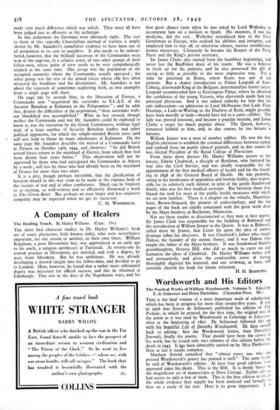A Company of Healers
The Healing Touch. By Harley Williams. (Cape. I5s.)
THE three first character studies in Dr. Harley Williams's book are of court physicians, little known today, who were nevertheless important, for one reason or another, in their own times. William Knighton, a poor Devonshire boy, was apprenticed at an early age to his uncle, a surgeon apothecary at Tavistock. At twenty-one he started practice in Devonport, got married, and took a degree, by post, from Aberdeen. But he was ambitious. He was already developing a shrewd insight into his fellow-men, and decided to go to London. Here, however, he found that a rather more substantial degree was necessary for official success, and this he obtained at Edinburgh. This was in the days of the Napoleonic wars, and his
first great chance came when he was asked by Lord Wellesley to accompany him on a mission to Spain. His manners, if not his medicine, did the rest. Wellesley introduced him to the First Gentleman in Europe, who realised his abilities and integrity, and employed him to buy off, or otherwise silence, various troublesome former mistresses. Ultimately he became the Keeper of the Privy Purse and the King's private secretary.
Sir James Clarke also started from the humblest beginnings, and never lost the Banffshire doric of his youth. He was a believer in fresh air for his patients, and he also possessed the gift of saying as little as possible in the most impressive way. For .a time he practised in Rome, where Keats was one of his patients. But a chance introduction to Prince Leopold of Saxe- Coburg, afterwards King of the Belgians, determined his future career. Leopold recommended him to Kensington Palace, where he obtained the confidence of the young Victoria, who afterwards made him her principal physician, And it was indeed unlucky for him that his sole indiscretion—an admission to Lord Melbourne that Lady Flora Hastings, a Lady-in-Waiting to the Duchess of Kent, might possibly have been morally at fault—should have led to a cause Mare. The lady was proved innocent, and became a popular heroine, and James Clarke a target for much popular abuse. The Queen, however, remained faithful to him, and, in due course, he too became 'm baronet.
William Jenner was a man of another calibre. He was the first English physician to establish the essential differences between typhus and typhoid fever on purely clinical grounds, and in due course he was elected President of the Royal College of Physicians.
From these three doctors Dr. Harley Williams passes to the lawyer, Edwin Chadwick, a disciple of Bentham, who battered his way into the Civil Service, and was chiefly responsible for the appointment of the first medical officers of health and for the found- ing in 1848 of the General Board of Health. He was probably, owing to his intolerance of opposition and human frailty, also respon- sible for its relatively early demise, in spite of the gentle Southwood Smith, who was his first medical assistant. But between them they blazed the trail for most of the public health measures with which we are now familiar. There is a chapter on the volatile, Mauritius- born, Brown-Sequard, the pioneer of endocrinology, and the last pages of the book are chiefly concerned with the great work done by the Mayo brothers at Rochester, Minnesota. Nor are these studies as disconnected as they may at first appear. Sir James Clark was responsible for the building of Balmoral and
the introduction of William Jenner to the Queen. It was at Balmoral, called there by Jenner, that Lister hit upon the idea of rubber drainage tubes for abscesses. It was Chadwick's father who taught Dalton, the founder of the atomic theory, and it was Dalton who taught the father of the Mayo brothers. It was Southwood Smith's granddaughter, Octavio Hill, who did so much to carry on and humanise the ideas of Chadwick. Dr. Harley Williams writes well and persuasively, and gives the comfortable sense of having thoroughly digested his material, and one reviewer, at least, will certainly cherish his book for future reference.
H. H. BASHFORD.






































 Previous page
Previous page